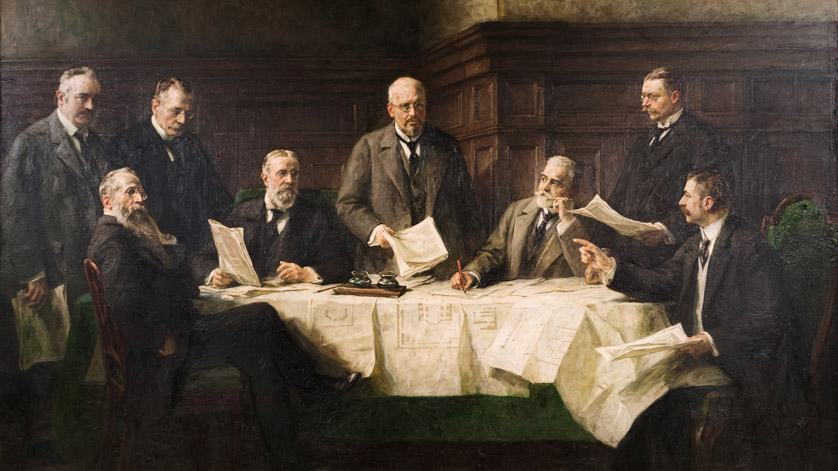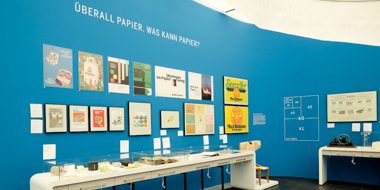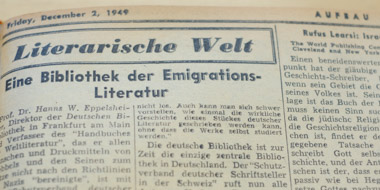History

From the 1990 unification treaty to the present
2023
- Johannes Neuer becomes the director and permanent deputy of the director general in Leipzig.
111 years after the foundation of the German National Library, we celebrated our anniversary by publishing 111 stories from the German National Library in our blog and holding a variety of events, both online and at our physical locations.
- Helke Rausch, a historian from Freiburg, has written a political chronicle of the Deutsche Bibliothek, which completes the previous works on the history of the German National Library published in 2018.The book was published by Wallstein Verlag in 2023.
Wissensspeicher in der Bundesrepublik. Die Deutsche Bibliothek in Frankfurt am Main 1945-1990
2020
Frank Scholze becomes the director general of the German National Library.
2018
The German Exile Archive 1933–1945 opens the permanent exhibition “Exile. Experience and Testimony” in Frankfurt am Main. In June, two academic studies are published on the history of the Deutsche Bücherei in Leipzig from the German imperial era to the end of World War II and during the Soviet occupation and the GDR era.
Sören Flachowsky, „Zeughaus für die Schwerter des Geistes “. Die Deutsche Bücherei während der Zeit des Nationalsozialismus (“Armoury for the Swords of the Intellect”. The Deutsche Bücherei during the National Socialist Era) (only available in German)
Christian Rau , „Nationalbibliothek“ im geteilten Land. Die Deutsche Bücherei 1945–1990 (A “National Library” in a Divided Country. The Deutsche Bücherei 1945–1990) (only available in German)
2015
All bibliographic data from the German National Library and the authority data from the Integrated Authority File (GND) are made freely available under a Creative Commons Zero licence. From 1 October, media works are catalogued in accordance with the Resource Description and Access (RDA) standard. The licensing service for out-of-commerce works is launched.
2013
The virtual exhibition “Arts in Exile” goes live. This network project was created under the management of the German Exile Archive 1933–1945 and is continuously expanded.
2012
The German National Library celebrates its 100th anniversary with 100 events. The official ceremony is held on 3 October in Leipzig, where the library was founded. The Federal Republic of Germany marks the occasion with a commemorative coin and a special postage stamp.
The German Museum of Books and Writing opens the permanent exhibition “Signs – Books – Networks: from Cuneiform to Binary Code”. The Integrated Authority File (GND) becomes operational.
Video: Das Gedächtnis der Nation: 100 Jahre Deutsche Nationalbibliothek (only available in German)
2011
On 9 May, the library extension in Leipzig is opened: the German Museum of Books and Writing moves into modern premises; the German Music Archive and other areas of the library receive climate-optimised stacks. The total collection in Leipzig encompasses 16.4 million units.
2010
The Deutsche Nationalbibliografie is offered as a free online newsletter. A new bibliography series, Series O for online publications, is introduced. The German Music Archive moves from Berlin to the Leipzig site.
2009
The German Museum of Books and Writing celebrates its 125th birthday. The catalogue enrichment service, which provides digitised and searchable tables of content, is launched.
2008
Michael Fernau becomes the director and permanent deputy of the director general in Leipzig. In October, the Federal Chancellor passes the Legal Deposit Regulation, which replaces the previous Mandatory Copy Regulation.
2006
On 29 June, the “Law Regarding the German National Library” comes into force. Its key amendment is the expansion of the collection mandate to include online publications. The law also renames the library with its sites in Leipzig, Frankfurt am Main and Berlin as the Deutsche Nationalbibliothek, the German National Library.
2004
The Deutsche Nationalbibliografie goes online and is made freely available for research purposes on the Internet.
2002
The voluntary depositing of online publications is agreed with German publishers via the German Publishers and Booksellers Association. The Börsenverein presents Die Deutsche Bibliothek with the collections from its library and its Historical Archive.
2001
Birgit Schneider becomes the permanent deputy of the director general at the Deutsche Bücherei in Leipzig.
2000
At the start of the year, the library becomes the system operator for the German Union Catalogue of Serials (ZDB). On 1 June, Die Deutsche Bibliothek takes over the standardisation tasks from the former German Library Institute and founds the Office for Library Standards as a separate organisation unit, together with the Committee for Library Standards.
1999
Dr. Elisabeth Niggemann becomes the director general of Die Deutsche Bibliothek. Ute Schwens becomes the director and permanent deputy of the director general in Frankfurt am Main.
1997
The Deutsche Bibliothek in Frankfurt am Main and its collection of around 6 million media units move into the new premises at Adickesallee.
1996
Irmgard Spencker becomes the permanent deputy of the director general at the Deutsche Bücherei in Leipzig.
1995
Die Deutsche Bibliothek goes online: the first homepage on the Internet is launched.
1993
The library software CBS, a client server system, is introduced.
1992
The Anne Frank Shoah Library of the Deutsche Bücherei in Leipzig is presented to the public and made available for use.
1991
On 3 January, the first issue of the joint German National Bibliography is published. The music information centre of the Association of Composers and Music Researchers of the GDR is integrated into the German Music Archive in Berlin.
1990
With the German Reunification of 3 October, the Deutsche Bücherei and the Deutsche Bibliothek are merged to form the institution of Die Deutsche Bibliothek. Its director general is Professor Klaus-Dieter Lehmann. The permanent deputy of the director general in Leipzig is Dr. Gottfried Rost; in Frankfurt am Main, Kurt Nowak.
The Deutsche Bücherei and the Deutsche Bibliothek from the end of the war to 1989
1988
Professor Klaus-Dieter Lehmann becomes the director general of the Deutsche Bibliothek in Frankfurt am Main. The “German Bibliography” is published as a CD-ROM for the first time.
1986
The restoration workshop at the Deutsche Bücherei in Leipzig is made into an IFLA (International Federation of Library Associations and Institutions) centre of conservation and restoration.
1985
The Deutsche Bücherei in Leipzig becomes an ISBN (International Standard Book Number) Agency of the GDR.
1982
The “Regulation on the Legal Deposit of Printed Works at the Deutsche Bibliothek” is revised. The stacks tower is inaugurated in Leipzig; the media collection at the Deutsche Bücherei encompasses 7.4 million units.
1977
At the Deutsche Bücherei in Leipzig, the national ISSN (International Standard Serial Number) Agency of the GDR is set up.
1976
Professor Günther Pflug becomes the director general of the Deutsche Bibliothek in Frankfurt am Main.
1973
The ordinance on the legal deposit of musical notes and music records at the German Music Archive comes into effect. The Deutsche Bibliothek in Frankfurt am Main joins the international ISSN (International Standard Serial Number) Network and founds the national ISSN Centre.
1971
The Deutsche Bücherei in Leipzig begins to create the “German National Bibliography” with the help of IT.
1970
The Deutsche Bücherei in Leipzig is assigned the role of “leading and coordinating institution for bibliography and bibliographic work in the GDR” by the Bibliotheksverband (Library Association).
What was hitherto the Deutsche Musik-Phonothek in West-Berlin is incorporated into the Deutsche Bibliothek in Frankfurt am Main as the German Music Archive.
1969
The Bundestag passes the “Law on the Deutsche Bibliothek”. The Federal Republic of Germany becomes the sole funding body. The Deutsche Bibliothek in Frankfurt am Main, now a federal institution with legal capacity under public law, becomes the Federal Republic’s central archive library. The depositing of mandatory copies for the first time becomes subject to federal law, after individual federal states and the GDR passed corresponding legislation concerning the obligations of publishers in the 1950s.
1966
The Deutsche Bibliothek in Frankfurt am Main begins to create its bibliographies with the help of IT.
1964
The materials of the German Paper Museum in Greiz are integrated into the collections of the German Museum of Books and Writing.
1961
Professor Helmut Rötzsch becomes the principal director (and director general from 1964 onwards) of the Deutsche Bücherei in Leipzig. He holds this office until 1990.
1959
The remaining collections from the library of the Börsenverein der Deutschen Buchhändler zu Leipzig are integrated into the German Museum of Books and Writing.
The Deutsche Bibliothek in Frankfurt am Main moves into its new premises in Zeppelinallee. Its collections encompass around 480,000 units. Professor Kurt Köster becomes its new director.
1955
The legal deposit of printed materials at the Deutsche Bücherei in Leipzig is regulated for the GDR by means of an ordinance. Curt Fleischhack becomes the new principal director of the Deutsche Bücherei.
1952
The Deutsche Bibliothek becomes a foundation under public law. Its patrons are the State of Hesse and the City of Frankfurt am Main. The Federal Republic of Germany and the Börsenverein des Deutschen Buchhandels (German Publishers and Booksellers Association) also contribute. All four become the funding bodies of the Deutsche Bibliothek.
1950
The German Museum of Books and Writing is incorporated into the Deutsche Bücherei in Leipzig.
1949
During a 1948 meeting between Hanns Wilhelm Eppelsheimer and the Association for the “Protection of German Authors in Switzerland” (“Schutzverband Deutscher Schriftsteller in der Schweiz”), the plan to create a “library for emigration literature” was forged. The association’s members provide their works published in exile for collection in the library. This eventually gives rise to the German Exile Archive 1933–1945.
1947
The Deutsche Bibliothek is legally decreed an institution of the book trade and the City of Frankfurt am Main. Professor Hanns Wilhelm Eppelsheimer becomes its first director.
1946
Dr. Georg Kurt Schauer, Heinrich Cobet, Vittorio Klostermann and Professor Hanns Wilhelm Eppelsheimer initiate the new foundation of a German archive library based in Frankfurt am Main. The national representatives of the book trade in the American zone agree to this suggestion. The City of Frankfurt guarantees personnel and financial support and the American military government gives its approval. On 4 November, the library officially receives the name “Deutsche Bibliothek” (“German Library”) and begins its work in the former Rothschild Library at Untermainkai.
This means that two libraries now exist in Germany that function as national libraries for what later becomes the German Democratic Republic and the Federal Republic of Germany. And two national bibliographic indexes are published, with the fledgling Western edition still facing many years of expansion.
1945
The Deutsche Bücherei reopens in November. However, owing to Germany’s division into four occupied zones, it can no longer pursue its national collection mandate unhindered.
From the foundation of the Deutsche Bücherei to the end of World War II
1943
The library is badly damaged during an air raid and closed to the public as a result. Around 1.6 million volumes are relocated.
1942
The collection mandate is expanded to include translations of German works, foreign-language works on Germany (Germanica), sheet music and art magazines.
1940
The “Law on the Deutsche Bücherei Leipzig” nullifies the Börsenverein's supervisory duties over the library. The library becomes an institution with legal capacity under public law.
1935
An order from the Reich Chamber of Culture obligates the associations, publishers and individuals under its jurisdiction to submit their works to the Deutsche Bücherei.
1933
The Deutsche Bücherei, which has hitherto been part of the Reich Ministry of the Interior, is taken over by the Reich Ministry of Public Enlightenment and Propaganda. Departments overseen by the NSDAP are created to monitor the measures for enforced cultural and intellectual conformity. Banned and ‘undesirable’ literature, such as exile literature, is withdrawn from general use.
1931
The “German National Bibliography” in the series A (new publications from the publishers’ book trade) and B (new publications from outside the publishers’ book trade) is published for the first time.
1924
Dr. Heinrich Uhlendahl becomes the new director of the Deutsche Bücherei. He holds this office until his death in 1954.
1921
The Börsenverein der Deutschen Buchhändler zu Leipzig tasks the Deutsche Bücherei with managing the “Daily index of new publications” and the “Weekly index of new and prepared publications from the publishers’ book trade”.
1917
Professor Georg Minde-Pouet assumes the directorship of the Deutsche Bücherei.
1916
Constructed during the war years from 1914 to 1916, the prestigious building of the Deutsche Bücherei at Deutscher Platz is formally inaugurated on 2 September.
1913
The Deutsche Bücherei begins operating from its offices in the Deutsches Buchhändlerhaus. The City of Leipzig and the Kingdom of Saxony provide funds for staffing and material costs. The Börsenverein agrees to provide the legal deposit copies from the publishing companies free of charge. Dr. Gustav Wahl is appointed as director and plays a key role in building the Deutsche Bücherei’s new premises and organising its collections up until 1916.
1912
The City of Leipzig, the Kingdom of Saxony and the Börsenverein der Deutschen Buchhändler zu Leipzig (German Book Traders’ Association of Leipzig) sign a contract for the foundation of the Deutsche Bücherei based in Leipzig. Its task is to collect, catalogue and make available for use all German and foreign-language literature published in Germany, as well as all German-language literature published abroad, from 1 January 1913 onwards.
Last changes:
12.12.2023
Contact:
webredaktion@dnb.de




